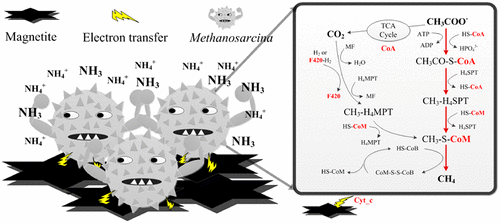当前位置:
X-MOL 学术
›
ACS Sustain. Chem. Eng.
›
论文详情
Our official English website, www.x-mol.net, welcomes your
feedback! (Note: you will need to create a separate account there.)
Tolerance of Aceticlastic Methanogenesis Enhanced by Magnetite under the Condition of Ammonia Stress
ACS Sustainable Chemistry & Engineering ( IF 7.1 ) Pub Date : 2020-01-10 , DOI: 10.1021/acssuschemeng.9b05585 Caiqin Wang 1 , Chen Wang 1 , Jieyi Liu 1 , Qiujin Xu 1 , Zixian Han 1 , Xiangyang Xu 1, 2, 3 , Liang Zhu 1, 2, 3
ACS Sustainable Chemistry & Engineering ( IF 7.1 ) Pub Date : 2020-01-10 , DOI: 10.1021/acssuschemeng.9b05585 Caiqin Wang 1 , Chen Wang 1 , Jieyi Liu 1 , Qiujin Xu 1 , Zixian Han 1 , Xiangyang Xu 1, 2, 3 , Liang Zhu 1, 2, 3
Affiliation

|
Magnetite-mediated direct interspecies electron transfer (DIET) has been considered as an effective mechanism to proceed the syntrophic methanogenic metabolism. However, the enhancement effect of magnetite on the methanogenesis via DIET is occasionally insignificant. Several clues have shown that the dominant aceticlastic methanogenesis could be a restrictive factor for the DIET enhancement of magnetite. To prove this, ammonia was used to inhibit the aceticlastic methanogenesis, and response of microorganisms to the ammonia stress in the presence of magnetite (2 g Fe/L, group M) and silica (2 g Si/L, group S) was investigated. Results showed that under the low ammonium concentration condition (147.3 mg-NH4+-N/L), aceticlastic methanogenesis was dominant in both groups, and the effect of magnetite addition was insignificant. With increasing ammonium concentration to above 1600 mg-NH4+-N/L, the methanization of acetate in both groups was inhibited. However, the methane production rate of group M was 50% higher than that of group S, and the candidate DIET partner Methanosarcina became more competitive in the presence of magnetite. The increase of key enzyme activities and expression of functional genes involved in the acetoclastic methanogenesis in group M indicated that the tolerance of aceticlastic methanogenesis could be enhanced by the magnetite addition under ammonia stress.
中文翻译:

氨水条件下磁铁矿增强的弹塑性产甲烷耐受性
磁铁矿介导的直接种间电子转移(DIET)被认为是进行同养型产甲烷代谢的有效机制。然而,磁铁矿对通过DIET甲烷化作用的增强作用有时是微不足道的。一些线索表明,主要的回弹甲烷化作用可能是DIET增强磁铁矿的限制因素。为了证明这一点,使用氨水抑制了乙腈的产甲烷作用,研究了在磁铁矿(2 g Fe / L,M组)和二氧化硅(2 g Si / L,S组)存在下微生物对氨胁迫的响应。 。结果表明,在低铵浓度条件下(147.3 mg-NH 4 +-N / L),两组均以破弹性甲烷化为主导,而磁铁矿添加的影响则微不足道。随着铵浓度增加至高于1600 mg-NH 4 + -N / L,两组中的乙酸甲烷化均受到抑制。但是,M组的甲烷生产率比S组高50%,并且在磁铁矿存在的情况下,候选DIET伙伴Methanosarcina更具竞争力。M组乙酰碎裂甲烷化中关键酶活性的增加和功能基因的表达表明,氨胁迫下磁铁矿的加入可以提高对乙酰碎屑甲烷化的耐受性。
更新日期:2020-01-10
中文翻译:

氨水条件下磁铁矿增强的弹塑性产甲烷耐受性
磁铁矿介导的直接种间电子转移(DIET)被认为是进行同养型产甲烷代谢的有效机制。然而,磁铁矿对通过DIET甲烷化作用的增强作用有时是微不足道的。一些线索表明,主要的回弹甲烷化作用可能是DIET增强磁铁矿的限制因素。为了证明这一点,使用氨水抑制了乙腈的产甲烷作用,研究了在磁铁矿(2 g Fe / L,M组)和二氧化硅(2 g Si / L,S组)存在下微生物对氨胁迫的响应。 。结果表明,在低铵浓度条件下(147.3 mg-NH 4 +-N / L),两组均以破弹性甲烷化为主导,而磁铁矿添加的影响则微不足道。随着铵浓度增加至高于1600 mg-NH 4 + -N / L,两组中的乙酸甲烷化均受到抑制。但是,M组的甲烷生产率比S组高50%,并且在磁铁矿存在的情况下,候选DIET伙伴Methanosarcina更具竞争力。M组乙酰碎裂甲烷化中关键酶活性的增加和功能基因的表达表明,氨胁迫下磁铁矿的加入可以提高对乙酰碎屑甲烷化的耐受性。











































 京公网安备 11010802027423号
京公网安备 11010802027423号